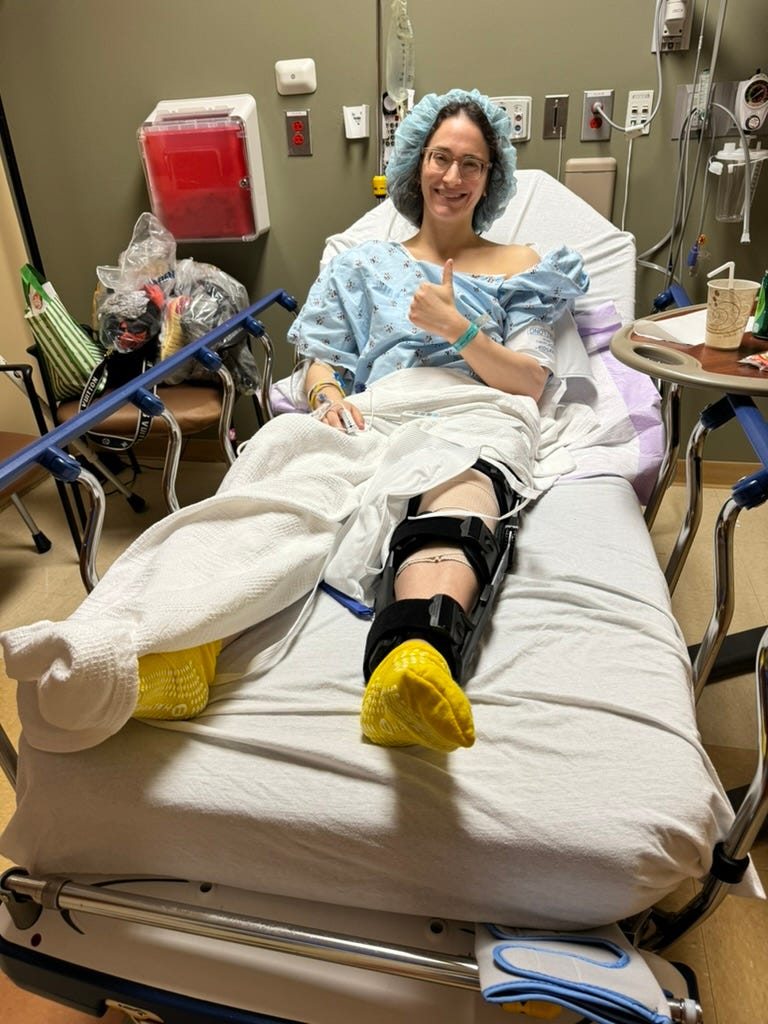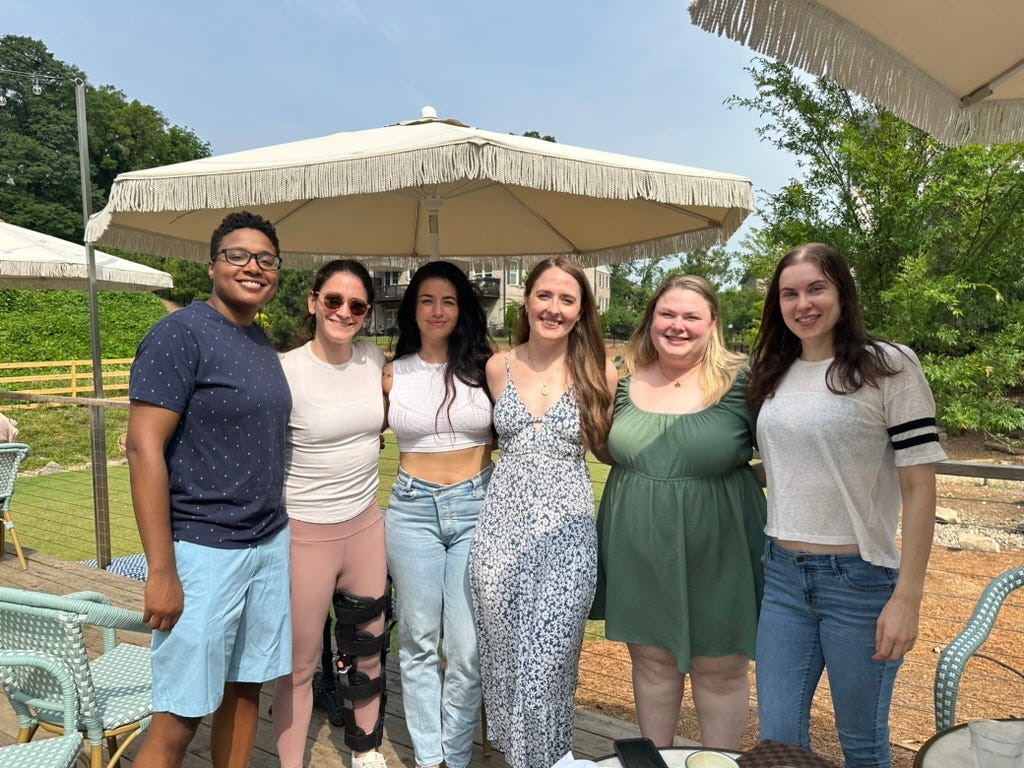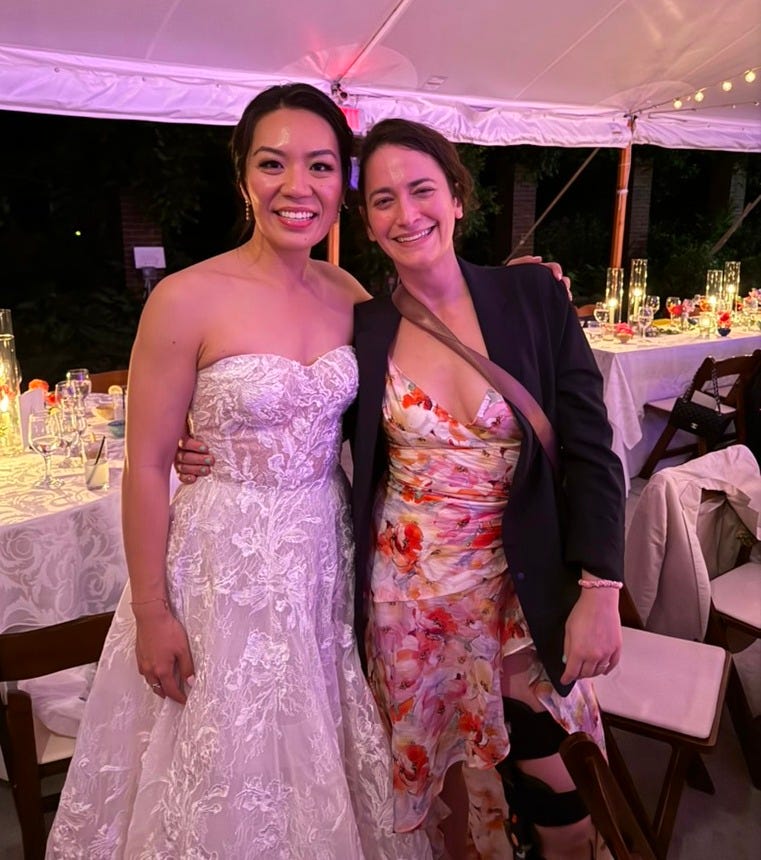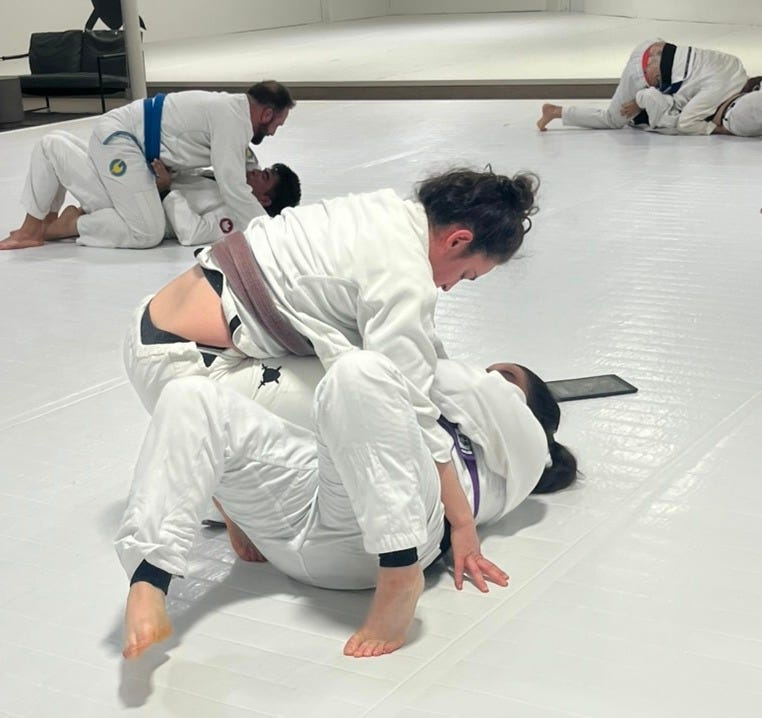Essay: "Sound and Fury": Reflections on Reaching One Year Post-Op
How does the long road to recovery signify something greater than nothing?
To the new subscribers or those who came my way by way of
‘s kind recommendation, welcome. I’m Erica, and I tend to write, interview, and opine on the worlds of combat and strength sports on this Substack.While my expertise lies in Brazilian jiu-jitsu, my interests lie broadly at the crossroads of sports, technology, and creativity. I love writing and reading any stories about individuals who bring a “fighting spirit” to their lives, from small business owners to jiu-jitsu athletes.
I hope you like what you see here and will share or comment—but most importantly, think—when something resonates with you.
Those who have followed me for a while know that I suffered a major knee injury in a jiu-jitsu competition in February 2024 (torn ACL, MCL, meniscus) had knee surgery for the damage a year ago in April 2024.1
Today’s piece is a reflection on recently reaching a one-year post-op milestone following that major knee surgery: what I remember, what I learned, and “what it means.”

What I remember from *the journey*
When it comes to the injury, the surgery, and the recovery, memory is a tricky subject.
“Time heals all wounds” they say, and part of that healing is forgetting.
One year post-op, I’m forgetting—both willfully and naturally—how awful it was for most of the time. The process of recollection is a peculiar mix of my failing to remember what happened and not wanting to remember what happened.
When I force myself to remember moments, this is what I come up with:
The moment before my knee collapsed, and my last thought before it: “She isn’t strong. She doesn’t have this.”2
The first night after the injury when I couldn’t get up the stairs and slept on the couch, kept awake by the pain and the dread associated with unanswered questions: What was the diagnosis? Would I need surgery? How long would I be out?
The last shower before the surgery (orange Hibiclens soap applied to a black washcloth to hide any visible staining from the soap) and the things I watched with my mom in the hours before the operation (one of those dessert competition shows on the Food Network)
When I force myself to remember feelings, this is what I come up with:
The stress of finding a care team in a new city within the schedule constraints of starting a new job: an endeavor that spanned three weeks and eight medical consultations: four meetings with surgeons, two with physical therapists, and two visits to imaging centers.
The heartbreak from the brutal monologue of the first surgeon I consulted: “You’re probably going to ask me whether you’ll be able to get back to the way you were before. Well, you were born perfect, and nothing we do ever gets us back to the way we were born.”
The discomfort and humiliation in the convoluted mechanics of living in the first weeks after surgery: from sleeping in the immobilizing brace, dressing and undressing the stitched-up flesh for showers and for inspection by various clinicians, and maneuvering myself into the car for rehab and anything resembling leisure.
There’s also a “whole that’s greater than the sum of its parts” when it comes to these memories, including:
The cloud of misery associated with instantaneous change: in a matter of seconds, the state of my life had gone from active and independent to sedentary and totally reliant. My husband bore the worst of this: he had signed up for “in sickness and in health,” and barely six months into marriage, he found himself having to carry me up the stairs, to the bathroom, and into the shower.
How my world shrunk dramatically, both physically and socially: when the circle of my existence had shrunk to a fifteen-foot radius, tasks like retrieving the mail became ambitious, exotic journeys. The main source of friendship and support I found outside of my house was from my physical therapist. My friends from my gym and jiu-jitsu were still around, but I felt increasingly isolated from their lives because I was no longer able to participate in their world.
The inevitable, deep, and multi-dimensional sense of loss: I lost the schedule of activity that had kept me grounded for seven years of my life. I lost trust in my body, and worse, felt failed by it. Most of all, I lost confidence in myself, questioning my identity along with any beliefs I once had that I was a “resilient” person.

What I learned from this *experience*
The advice that works for others won’t always serve you
“Keep going to the gym, even if only to watch class” is a common piece of advice for the injured in my sport of choice. At first, I kept the habit of going to the jiu-jitsu gym, sitting on the benches once a week, watching classes to keep myself engaged, have a social outlet, and, at minimum, a reason to leave the house for something other than PT.
After doing this for the first six months post-op, I gave up on it. For me, it did not serve as a net positive for my mental health. I found myself obsessing over who was improving and how quickly, how behind I’d be when I came back—if I came back. I wasn’t training or competing, and somehow, I was still in this awful mindset of comparing myself to other people.
People who asked about how I was doing walked on a spectrum: care and curiosity on one side, pity and judgment on the other. It’s easier to remember the conversations on the latter part of that spectrum. I wasn’t having a great recovery. I couldn’t explain why that was the case—and people always asked—let alone understand it myself. I preferred to avoid these conversations rather than have them repeatedly.
You don’t get a medal for recovery, but that doesn’t mean that it’s not an achievement
Someone told me something like this in the last few months. I don’t remember who mentioned it, but it stuck. It’s cheesy, it’s true, and I admit it–even if reluctantly and begrudgingly.
I’m achievement oriented and I’m competitive. It’s helpful in some areas of life and harmful in others–including in jiu-jitsu. It’s hard to feel proud about my rehab because it’s something that was necessary if I wanted to live a normal life.3 Sitting down for the practice of identifying my “little wins” often felt stupid but was important.
Then I remember that there are plenty of people who don’t stay consistent with the rehab and end up with ongoing pain or weakness. Others come back too soon and end up re-injured. I was frustrated by the pace of it, but my body did what it was supposed to do. It healed.
Full recovery is an achievement.

I still care enough about my sport to risk reliving this process again
Looking back at 2024 mostly makes me sad, but there are a few moments that made me proud. One of those moments was two days before the new year, when I found the courage to get back on a mat to drill.
As I write this, what was unfathomable back in December is possible in May. I’m able to complete a full jiu-jitsu class instead of just stopping at the technique instruction. My leg can hold up to rounds of sparring of increasing intensity. I don’t need to ask for as many modifications or concessions from training partners when drilling or rolling.
My reflexes, offensiveness, and explosiveness are lacking, but the leg holds up. Week over week, the issues I have with my jiu-jitsu are slowly shifting from “the consequences of the injury” to “the things that I sucked at before the injury that I always needed to fix.”
In the coming months, I hope to be able to increase my volume from two classes to four classes a week. Next year, I could see myself competing again. After all this, I’d still risk it all–the money, the time, the stitches–to feel like I was doing the thing I care about in a competitive fashion.
It’s a one-sided love, this sport, and yet I’m content to keep pouring an irrational amount of my care and attention into it, eight years in. What baffles me most is this: the thing that is responsible for breaking me is the thing I would let break me again and the thing I refuse to give up on.
Sisyphus, meet Boulder.

The *meaning* of it all
When I went into surgery and people asked me how I was feeling, the best line to describe my mentality was from Hamlet: “The readiness is all.”
One year later, a different Shakespeare line comes to mind to describe the state of mind about the injury and state of my life after this off-season period: “Full of sound and fury, signifying nothing.”4
My first instinct is to remember 2024 as a terrible year that should be wiped off the map of my memory. My second is that I wish I had more to show for the off-time. A new manuscript. More articles. Mastery of some other language. Better calligraphy. Hobbies that are equally fulfilling while being kinder on the body and the mind.
While I can point to a few things that I’ve learned, I don’t have any meaning to draw from this injury except that it was a horrible thing, a thing I’d prefer to forget, and that I am relieved is running its course to conclusion.
Aside from finding solace in Shakespeare, I think the best-rendered wisdom I found for trauma during my unpleasant “off-season” came from Better Call Saul.
Triumph looks like waking up one day and realizing you’re not thinking about it anymore.
Or, as my husband says–ironically after my trying to say something about it for the last ~1,500 words:
“It’s a good thing that you don’t feel like you have anything to say. That means you’ve gotten over something traumatic.”
There’s only an after and an onward. There’s no going backward, only moving forward.
Closing out
Stay tuned for a new interview piece this month focused on one of the most unique figures in the world of Brazilian jiu-jitsu, competitor-turned-mental health advocate and performance coach, Erin Herle.
If you’re not already subscribed, you can do so below. My hope is to keep up the cadence of a monthly interview while adding regular essays back into the mix as well on this Substack.
Life is—officially—leaps and bounds ahead of where it was. Thanks for reading.
I half-documented my thoughts and feelings about this experience on a separate Substack, Becoming Undeniable. I abandoned it about six months in. I realized I wasn’t enjoying the process of reflection (because I was so depressed), and it became detrimental to sit down, weekly or biweekly, and think about how injured or feeble I still was or how slow my progress was. Like most things, if it isn’t serving you, then
She wasn’t strong and she didn’t have “this,” referring to the muscle sweep as it’s technically supposed to be executed. That didn’t matter. Try to hold an athletic base as someone throws their posterior chain, full force, into the side of your knee, and technique doesn’t mean shit.
Read: be able to walk through a crowd, travel for work, not clutch the railing and cry every time I have to descend a flight of stairs
I have a soft spot for Macbeth as 1. The first Shakespeare play I ever read and 2. I have an awesome old school copy that my dad used when he was in school. It’s among the few belongings of his that I’ve kept since he passed away.




Sisyphus, meet Boulder. Love this!!
When skiers get together, we talk about our ACLs, PCL's --all our CL's. Then we snap our skis on and go back out there. When chefs get together, we share scars and burns (think of the scene from Jaws on the boat). Then we make another meal. When you are obsessed, injuries are part & parcel and maybe even part of the thrill. Something to feed our inner adrenalin junkie? It absolutely, positively, life alteringly sucks to be injured. But you're doing the recovery in grand fashion - so keep at it.